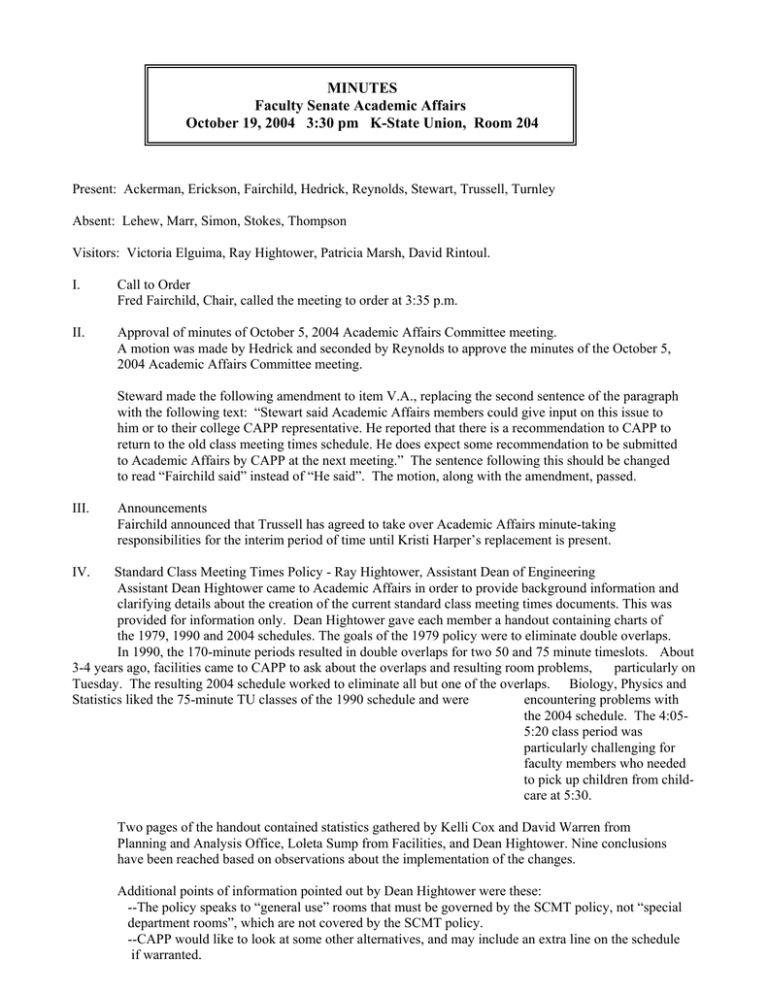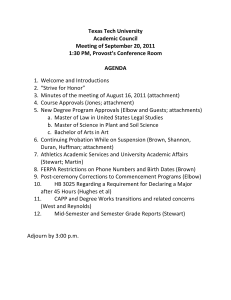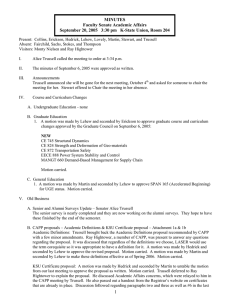MINUTES Faculty Senate Academic Affairs
advertisement

MINUTES Faculty Senate Academic Affairs October 19, 2004 3:30 pm K-State Union, Room 204 Present: Ackerman, Erickson, Fairchild, Hedrick, Reynolds, Stewart, Trussell, Turnley Absent: Lehew, Marr, Simon, Stokes, Thompson Visitors: Victoria Elguima, Ray Hightower, Patricia Marsh, David Rintoul. I. Call to Order Fred Fairchild, Chair, called the meeting to order at 3:35 p.m. II. Approval of minutes of October 5, 2004 Academic Affairs Committee meeting. A motion was made by Hedrick and seconded by Reynolds to approve the minutes of the October 5, 2004 Academic Affairs Committee meeting. Steward made the following amendment to item V.A., replacing the second sentence of the paragraph with the following text: “Stewart said Academic Affairs members could give input on this issue to him or to their college CAPP representative. He reported that there is a recommendation to CAPP to return to the old class meeting times schedule. He does expect some recommendation to be submitted to Academic Affairs by CAPP at the next meeting.” The sentence following this should be changed to read “Fairchild said” instead of “He said”. The motion, along with the amendment, passed. III. Announcements Fairchild announced that Trussell has agreed to take over Academic Affairs minute-taking responsibilities for the interim period of time until Kristi Harper’s replacement is present. IV. Standard Class Meeting Times Policy - Ray Hightower, Assistant Dean of Engineering Assistant Dean Hightower came to Academic Affairs in order to provide background information and clarifying details about the creation of the current standard class meeting times documents. This was provided for information only. Dean Hightower gave each member a handout containing charts of the 1979, 1990 and 2004 schedules. The goals of the 1979 policy were to eliminate double overlaps. In 1990, the 170-minute periods resulted in double overlaps for two 50 and 75 minute timeslots. About 3-4 years ago, facilities came to CAPP to ask about the overlaps and resulting room problems, particularly on Tuesday. The resulting 2004 schedule worked to eliminate all but one of the overlaps. Biology, Physics and Statistics liked the 75-minute TU classes of the 1990 schedule and were encountering problems with the 2004 schedule. The 4:055:20 class period was particularly challenging for faculty members who needed to pick up children from childcare at 5:30. Two pages of the handout contained statistics gathered by Kelli Cox and David Warren from Planning and Analysis Office, Loleta Sump from Facilities, and Dean Hightower. Nine conclusions have been reached based on observations about the implementation of the changes. Additional points of information pointed out by Dean Hightower were these: --The policy speaks to “general use” rooms that must be governed by the SCMT policy, not “special department rooms”, which are not covered by the SCMT policy. --CAPP would like to look at some other alternatives, and may include an extra line on the schedule if warranted. --CAPP is looking into room availability for seminars. High tech rooms are generally needed for seminars. CAPP unanimously voted to accept the following recommendations to be forwarded to the Academic Affairs Committee: 1. Leave the 2004 standard class meeting time (SCMT) policy in effect, using exceptions where reasonable (CAPP recommends moving the 75 SCMT of 4:05-5:20 p.m. to 3:55-5:10 p.m. 2. Continue studying concerns, and prepare any additional recommendations before the scheduling process begins for the spring 2006 semester. 3. Communicate to the faculty the fact that the 2004 SCMT policy allows 75-minute class periods on Monday/Wednesday, Wednesday/Friday, and Monday/Friday as appropriate, if a department is not moving to simply eliminate Friday classes. Ackerman thanked Dean Hightower for coming and expressed that we need to make sure that 2 important things continue to be communicated to faculty: 1. Ongoing exceptions can be given, so once the process is completed, a permanent exception is created. 2. The policy applies ONLY to general use facilities not dedicated departmental space. Rintoul commented that many classes are affected, and graduate students are definitely affected. Some departments, such as English, do not have their own dedicated departmental space. Twenty departments of Arts and Sciences do not have class space of their own. Fairchild asked how timing affects the inconvenience. Rintoul responded that many departmental activities (i.e. departmental meetings) have been shoved to even later in the day, and that is a further encumbrance of valuable faculty time. Rintoul reiterated that he is mostly disappointed with the delay in getting data that was requested last October (2003). He believes that all the data was not available when the changes were made. He also would like to see data on the percentage of 3-hour classes that are 75-minute periods on Tuesday/Thursday. Rintoul suggested that if the vast majority of classes are 3-hour classes, we need to make the schedule revolve around them. Also, he believes that if there are multi-section classes taught in dedicated space, they should not be part of the schedule. Dean Hightower responded that CAPP would like to be informed of specific examples of classes that are required to run too late. V. Course and Curriculum Changes A. Undergraduate Education 1. A motion was made by Stewart and seconded by Erickson to approve undergraduate course and curriculum changes approved by the College of Education September 28, 2004. MINOR MODIFICATIONS: EDADL 212 Intro to Leadership Concepts 2. A motion was made by Erickson and seconded by Stewart to approve undergraduate course and curriculum changes approved by the College of Human Ecology October 6, 2004. Department of Apparel, Textiles, and Interior Design Changes to the Selective Advancement in Apparel & Production Specialization. See page 1 of white sheets for rationale. School of Family Studies and Human Services CHANGE: Page 220, undergraduate Catalog, 2004-2006 Delete the dual degree: Family studies and human services and social work. The dual degree of Family Studies and Human Services and Social Work is being eliminated at the request of the Social Work program. See page 2 – 3 of the white sheets for further details/rationale. B. Graduate Education 1. A motion was made by Erickson and seconded by Stewart to approve Graduate course and curriculum changes approved by the Graduate Council October 5, 2004. CHANGE ARCH 655 International Field Study Arch 715 Topics in Architecture Seminar CS 736 Pleasure Horse Medicine EDSEC 620 Principles and Philosophy of Career and Technical Education EDSEC 621 Program Planning in Career and Technical Education HN 610 Life Span Nutrition HN 630 Clinical Nutrition HN 718 Physical Health and Aging HN 815 Molecular Basis of Nutrient Function HN 995 Grantmanship and Publication ADD ARCH 654 EDCEP 851 HN 735 Study Abroad Orientation Multicultural Aspects of Academic Advising Energy Balance C. General Education - none VI. A. Old Business Standard Class Meeting Times Update - Dave Stewart Stewart commented that in the light of attention that this issue has received, there is a need for accountability to Faculty Senate. He suggested considered acting upon the CAPP recommendation sent to Academic Affairs. (see item IV above) This is the three-point recommendation on the last page of the CAPP report. Stewart moved and Trussell seconded a motion to accept the CAPP 3-point recommendation and forward it to Faculty Senate. B. Academic Definitions Update - Fairchild Nothing to report C. Senior and Alumni Surveys Update - Fairchild Recommendations for members of the committee have been forwarded to the Provost’s office. D. Assessment Update - Patricia Marsh Marsh’s initial comment was a question concerning how to best remind faculty of the deadlines for assessment plans to be submitted. Not all departments are aware that they need to have a report submitted by November 1. Fairchild responded that this should probably go through the Provost’s office to send out a listserv notification to Deans and department heads that the November 1 deadline is in effect for every department on campus. Every degree program needs to have an assessment plan submitted. Stewart suggested that a reminder be given at the Dean’s Council meeting. By the end of November, the Deans need to submit a report to the Provost that includes different department plans and any updates. Departments with collaborations can have a delayed deadline due to the need to get information from other institutions. Marsh reiterated that deadlines for assessment related things are coming up. The Student Learning Outcomes should have been done in December 2003, and learning outcomes from departments, etc., are due for submission to the Provost on December 6, 2004. Also, this assessment process has created College-wide Assessment Review Committees. The Office of Assessment and Program Review has provided training to clarify specifically what these assessment plans should contain. Departments were cautioned not to be too ambitious. This should maximize efficiency before the reports reach Provost. This process will take us into the spring. VII. New Business A. Approve additions to graduation lists. A motion was made by Erickson and seconded by Reynolds to approve the additions to graduation lists. August 2004 Amy D. Kuhl-Roberts, Human Ecology, BS-Human Nutrition-Public Health Nutrition (J-1) May 2004 Tiffany Lee, Arts and Sciences, BS-Theater December 2003 Brook Centivre, Engineering-Architechtural Engineering Jonathan D. Philgreen, Arts and Sciences, BS-Speech May 1992 Bradford J. Salyer, Education – Secondary Education VII. A. Committee Reports Thompson on General Education Council - report tabled; Thompson not present B. Trussell report on University Library Committee - no report; the committee has not met since the last Academic Affairs meeting C. Stewart report on Committee on Academic Policy and Procedures (CAPP) -Trussell gave the update since she substituted for Stewart at the last CAPP meeting. Highlights of the CAPP meeting included these points: --the certificates subcommittee is back up and running and they hope to have a report next month --babies in class. Is there a policy? A university-wide policy could not be found, and noisy &/or nursing babies are a bit of a distraction to the faculty and classmates --updates on LASER. The deadline for implementation has been deferred due to the delays in implementing ORACLE. ORACLE does not handle everything the same as the current system can, so there are delays in getting it configured to perform some specific functions needed. Hopefully the mainframe will continue to function while running during the period of time that is past its previously predicted lifespan. --advisor assignments are being uploaded on Oct. 18. Provost Nellis has substituted a question about diversity experiences for the one-time UGE question that Provost Coffman included last year. --final exam policy and the increasing schedule conflicts for persons enrolled in both daytime and evening classes. Students need to be aware of potential conflicts and make alternative arrangements in order to resolve the time conflicts. --standard academic Definitions. Dean Hightower passed out a draft copy of a new list. The definitions are grouped by function rather than alphabetically. The committee requested that they be revised to reflect an alphabetical arrangement. D. Reynolds report on Student Senate - no report E. Fairchild report of Class Drop Policy subcommittee -The committee has been formed and Jim Hamilton is the Chair. F. Hedrick report on the General Education Steering Committee - none; Hedrick has to leave the meeting early. G. Lehew/Stokes report on Prerequisites Task Force - none; neither was in attendance VIII. For the Good of the University Reynolds would appreciate input for the GenEd forum. Gerald Reeke is heading. Stewart commented that evening college restarted in fall of 2003. It was anticipated that an enrollment of 300-400 would be a success. Instead, 800 enrolled. This year, close to 1,600 (double last year) have enrolled. This is exciting for many reasons, especially for the fact that it is meeting students’ needs as well as drawing non-traditional students into the university. IX. Adjournment The meeting adjourned at 4:50 p.m. the

